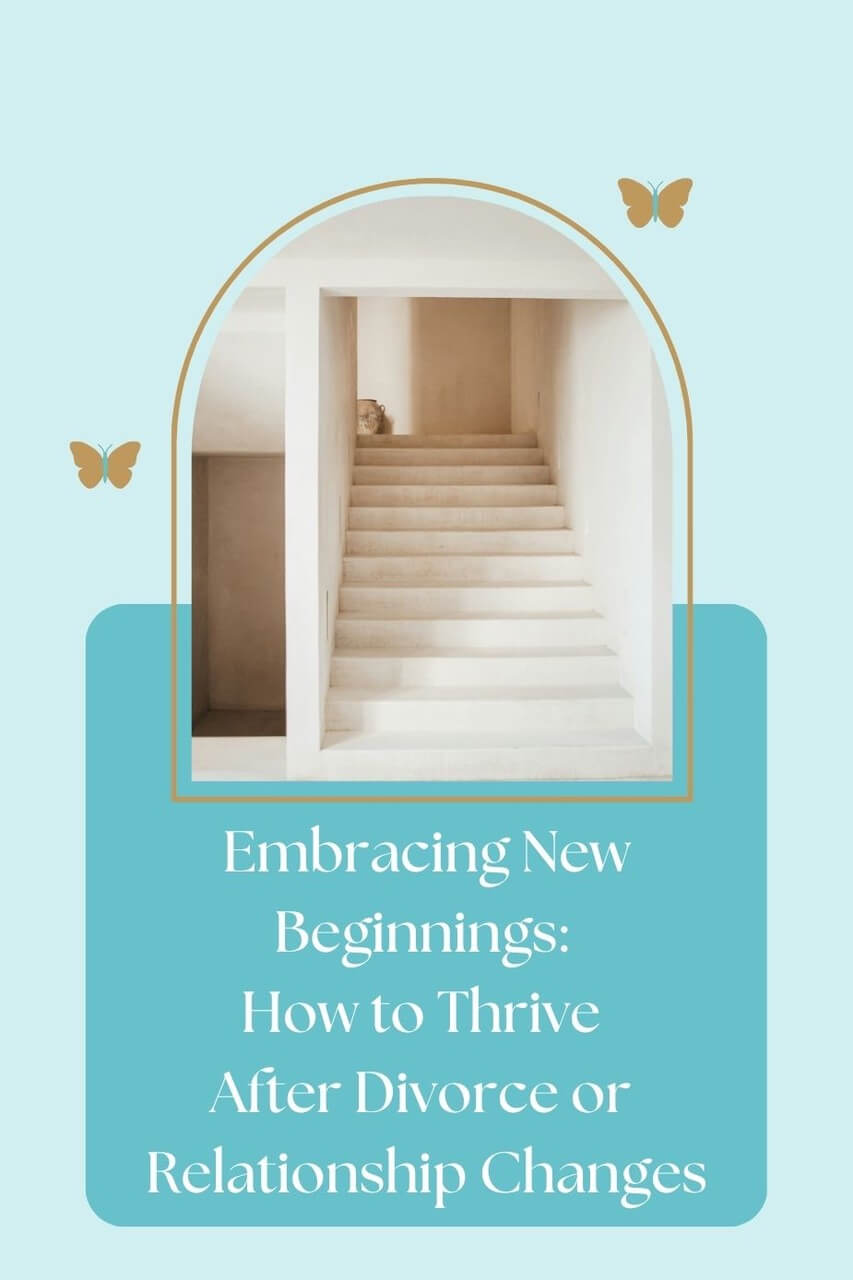Therapeutic strategies for healing and rediscovering oneself after the end of a significant relationship.
The Impact of Relationship Endings
Ending a significant relationship, whether through a divorce or a breakup, is a major life transition. It can feel like the ground beneath you has shifted, leaving you unsure of how to move forward. This period can be incredibly challenging. But it is also an opportunity for growth and self-discovery.
Types of Relationship Endings
- Divorce: Divorce often involves legal proceedings, division of assets, and potential custody arrangements if children are involved. The emotional toll can be immense, with feelings of loss, betrayal, or failure. This process can be lengthy and complicated. Impacting various aspects of your life, including your financial stability and social connections.
- Long-term Relationship Breakups: Breakups after a long-term relationship can be just as painful as divorce. Especially if the relationship is deeply integrated into your daily life and future plans. The sense of loss and the need to rebuild your life can be overwhelming. You might need to move to a new place, adjust to new routines, and redefine your personal identity outside of the relationship.
- Short-term Relationships: Even shorter relationships can leave a lasting impact. Especially if they end abruptly or under difficult circumstances. The intensity of the emotions involved, even over a shorter period, can make the end of a short-term relationship particularly jarring and disorienting.

Healing Through Holistic Therapy
What is Holistic Therapy?
Holistic therapy focuses on treating the whole person – mind, body, and spirit. It recognizes that emotional pain from a breakup can affect your physical health and overall well-being. By addressing all aspects of your life, holistic therapy helps you heal more completely.
Therapeutic Strategies for Healing
Mindfulness and Meditation
Mindfulness and meditation can help you stay present and reduce anxiety. Simple practices like deep breathing and guided visualization can calm your mind and help you focus on healing. Practicing mindfulness alone allows you to connect deeply with your inner self. While group meditation sessions can provide a sense of community and shared experience.
Self-Reflection and Journaling
Writing down your thoughts and feelings can be incredibly therapeutic. It allows you to process emotions and gain insight into your experiences. Journaling privately offers a safe space to explore your innermost thoughts. Whereas sharing reflections in a supportive group can foster connection and understanding.
Acceptance and Letting Go
Accepting that the relationship has ended is crucial for moving forward. This doesn’t mean forgetting the past but rather acknowledging it and allowing yourself to let go. Practicing acceptance individually helps internalize the healing process. While discussing it with friends or a life transition therapist can provide additional perspectives and support.
As you begin to accept and let go of your past relationship, it is important to focus on the future. This transition phase can be an opportunity to reconnect with yourself and explore new possibilities. Embracing this period of change with an open mind can lead to significant personal growth and self-discovery. It’s about shifting your mindset from what was lost to what can be gained. By doing so, you set the stage for a deeper understanding of who you are and what you truly value in life.
Rediscovering Yourself
Self-Discovery and Personal Growth
Post-relationship is a time to rediscover who you are and what you want from life. Engaging in activities that you enjoy and exploring new interests can be very fulfilling. Let’s take a look at several below.
Exploring New Interests
Trying new hobbies or revisiting old ones can be a great way to reconnect with yourself. Engaging in activities alone can provide deep personal satisfaction and self-knowledge while participating in group activities can help build new social networks and support systems.
- Arts and Crafts: Engaging in creative activities like painting, drawing, or crafting can be a great way to express your emotions and discover new talents.
- Outdoor Activities: Spending time in nature, hiking, biking, or gardening can help you feel more connected to the world around you and improve your physical health.
- Learning and Education: Taking up new courses or attending workshops can expand your knowledge and open up new career or personal opportunities.
Setting New Goals
Setting personal goals gives you something to strive for and can help you rebuild your confidence. Working towards goals independently emphasizes self-reliance and personal strength, whereas sharing goals with others can create accountability and mutual encouragement.
- Personal Growth: Focus on goals that enhance your self-awareness and personal development. This could include reading self-help books, attending personal development seminars, or working with a coach or therapist.
- Career Goals: Setting new career objectives can provide direction and motivation. This might involve seeking promotions, changing career paths, or starting a new business.
- Health and Wellness: Prioritize your physical and mental health by setting fitness goals, adopting a healthier diet, or establishing a regular sleep routine.

When You’re Feeling Lost Using Values as a Compass
Identifying Core Values
Identifying your core values can help you make decisions that align with your true self and create a sense of direction and purpose. If you’re asking yourself “Where do I go?” or “What do I do next?”, values can act as a compass of sorts, guiding you through life’s changes and transitions and offering direction.
Reflecting on What Matters Most
Take time to reflect on what truly matters to you. These might include honesty, compassion, independence, or creativity. Writing down your values can clarify them and help you stay focused on what is important to YOU.
- Honesty: Emphasizing truthfulness in your interactions and relationships.
- Compassion: Showing empathy and care towards yourself and others.
- Independence: Valuing your ability to make decisions and take care of yourself.
- Creativity: Pursuing imaginative and original activities.
Using Values to Create a Map
Once you have identified your core values, use them to create a “map” for your life. This map can guide your actions and decisions, helping you navigate the uncertainties of a major life transition. Living in alignment with your values can help decrease stress, anxiety, and depression.
Making Value-Driven Decisions
When faced with decisions, ask yourself which option aligns best with your values. This can make choices clearer and more meaningful, ensuring that your actions reflect who you are and what you stand for.
- Decision-Making Framework: Develop a personal framework that helps you evaluate choices based on your values. This could involve asking questions like, “Does this align with my value of honesty?” or “Will this decision support my independence?”
- Daily Practices: Incorporate your values into daily practices. For example, if compassion is a core value, make a habit of performing acts of kindness or practicing self-compassion.
Coping with Loneliness
Building a Support System
Surrounding yourself with supportive friends and family is crucial during this time. Don’t be afraid to reach out and ask for help. Building a support system through personal connections can provide emotional stability while joining support groups can offer shared experiences and collective wisdom.
- Friends and Family: Lean on close friends and family members who can offer emotional support and practical assistance. Regular communication with loved ones can help you feel connected and understood.
- Support Groups: Consider joining support groups for individuals going through similar experiences. Sharing your story and hearing others’ stories can provide comfort and reduce feelings of isolation.
Engaging in Social Activities
Joining clubs, groups, or classes can help you meet new people and reduce feelings of loneliness. Engaging in social activities individually allows for personal growth and new experiences while participating in group settings fosters community and camaraderie.
- Hobbies and Interests: Participate in activities that interest you, such as book clubs, sports teams, or hobby groups. These settings provide opportunities to meet like-minded individuals and form new friendships.
- Community Involvement: Volunteer for local organizations or participate in community events. Giving back to your community can provide a sense of purpose and connection.
As you begin to reconnect with others through social activities, it’s equally important to find comfort and strength in your own company. Balancing social interactions with moments of solitude can help you build resilience and deepen your self-understanding. By alternating between engaging with the outside world and turning inward, you create a harmonious approach to healing and personal growth. This balance ensures that you not only rebuild your social network but also cultivate a strong sense of self-reliance and inner peace.
Embracing Solitude
While loneliness can be challenging, learning to enjoy your own company and embracing solitude can lead to profound personal growth. Solitude provides an opportunity for deep introspection, allowing you to reconnect with your inner self and understand your needs and desires better. This quiet time can be incredibly healing, giving you the space to process your emotions without external distractions.
Mindful Solitude
Spend time alone in activities that nourish your soul, such as reading, meditating, or taking long walks. Use this time to reflect on your journey and appreciate your own strengths. These mindful practices help ground you in the present moment and can be very calming and restorative.
- Reading: Lose yourself in a good book that inspires or entertains you. Reading can be a great escape and a source of new ideas and perspectives.
- Meditation: Practice meditation to quiet your mind and connect with your inner self. Even a few minutes a day can significantly impact your mental well-being.
- Nature Walks: Spend time in nature, observing its beauty and tranquility. Walking in a park or along the beach can be particularly soothing and help you feel more connected to the world around you.
Self-Compassion
Practice self-compassion by being gentle with yourself during moments of loneliness. Remind yourself that it’s okay to feel lonely and that these feelings are temporary. Treat yourself with the same kindness and understanding that you would offer to a friend in need.
- Positive Affirmations: Use positive affirmations to remind yourself of your worth and strength. Phrases like “I am enough” or “I am capable of handling this” can boost your confidence and self-esteem.
- Self-Care Rituals: Create rituals that make you feel cared for and loved. This could include taking a relaxing bath, cooking your favorite meal, or spending time on a hobby you enjoy.
- Reflection: Use this time to reflect on your experiences and what you’ve learned about yourself. This can help you gain insight and perspective, fostering personal growth and resilience.
By embracing solitude, you can turn loneliness into a powerful tool for self-discovery and healing, allowing you to emerge from this transition stronger and more self-aware.

Building a New Life Aligned with Your True Self
Embracing New Opportunities
Look at this transition as a chance to create a life that truly reflects who you are now. Embrace new opportunities and be open to change. Exploring new opportunities alone can lead to profound personal insights while doing so with friends or peers can provide encouragement and diverse perspectives.
Creating a Vision for the Future
Visualize the life you want to live. This can help you stay focused and motivated as you navigate this transition. Creating a personal vision can instill a sense of purpose and direction while sharing your vision with others can foster support and inspiration.
Finding Support with Marilyn Ashley, LMFT
If you’re navigating a major relationship change, remember that you don’t have to do it alone. Seeking professional support can make a significant difference in your healing journey. Marilyn Ashley, LMFT, offers compassionate and holistic therapy to help you embrace new beginnings and thrive. Reach out today to start your path to healing and rediscovery. Your new beginning is just a step away.
Find Holistic Support Navigating Divorce or Other Relationship Changes With the Help of Life Changes Therapy in Manhattan Beach, CA
Are you navigating the pain of a recent divorce or major relationship change? Our holistic life transition therapy offers personalized support to help you heal and rediscover your true self. At Marilyn Ashley, LMFT you will work with a skilled life transition therapist who can help you begin embracing your new beginnings. Follow these three simple steps to get started:
- Schedule Your 20-Minute Complimentary Phone Consultation
- Learn More About Me and My Services
- Begin your healing journey and embrace new beginnings.
Other Services Offered By Marilyn Ashley, LMFT
At my Hermosa Beach, CA practice, Life Changes Therapy is just one of the services I offer to help you find support in overcoming relationship changes. I also specialize in Anxiety Therapy, Trauma, and Couples Therapy. For your convenience, I offer in-person sessions in my beautiful Hermosa Beach, CA office, which may clients comment on how calming it is and how grounded, content, and serene they feel there. I also offer online therapy sessions for those located anywhere in California. By incorporating holistic practices into your daily life, you can support your overall well-being. I’m excited to work with you on your journey towards healing and growth. Together, let’s embrace your anxiety and learn how to thrive, not just survive! Check out my blog for more about holistic healing!

Hi there!! I’m Marilyn. I empower individuals to embrace their true selves, heal holistically and flourish. I provide in-person therapy in Hermosa Beach, California and the greater South Bay area as well as online therapy throughout California, Colorado, Florida, Kansas and South Carolina. Click here to get started.

